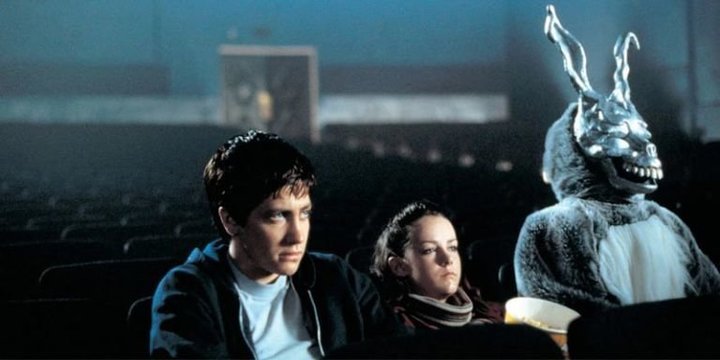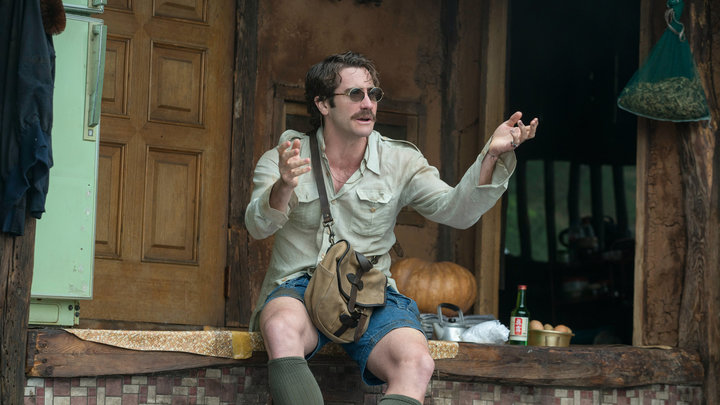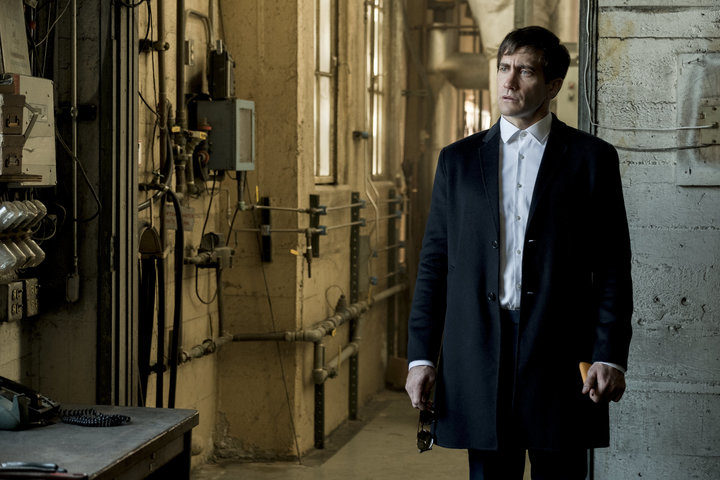[ad_1]
Jake Gyllenhaal struts into the opening frames of “Velvet Buzzsaw” shoulders first. Rounding the corner of a Miami convention center playing host to a famous art fair, he saunters ahead of a crowd, head held high. His torso thrusts him ahead, the sway of someone who needs no pep talks about self-worth. He’s wearing sunglasses indoors.
When a voice offscreen calls out, “Hey, Morf!” ― his character’s name is Morf; let’s reflect on that for a second ― Gyllenhaal raises a hand to wave but suspends it in midair without wiggling a single finger. His smirk does the talking. As one of the highfalutin art scene’s preeminent critics, he’s accustomed to bootlickers, so much so that performative snobbery is part of the job. When he pauses to survey a ridiculous robot exhibit a moment later, he cocks the left side of his body forward, a stance that conveys loud disdain.
Less than two minutes into the movie, when he has still barely spoken, we already know this is one of those Jake Gyllenhaal performances.
You know the kind I’m talking about: the big kind. The kind with the affected voices and bug-eyed intensity and over-the-top mania. The best kind.
We first saw it in “Bubble Boy,” back when Gyllenhaal was merely the earnest wunderkind from “October Sky” and the kaleidoscopic oddball from “Donnie Darko.” Not yet a household name, we couldn’t fully appreciate his elastic face or thin baritone; we didn’t know how adept he was at turning a one-joke conceit ― in this case, a boy living in a sterilized bubble ― into a fully realized but no less absurd human. When the character says the Pledge of Allegiance to distract himself from a bewildering first erection, Gyllenhaal accelerates the recitation as if a bomb were about to go off, his voice growing more nasal by the millisecond. Jake Gyllenhaal, king of chaos.

You can see Gyllenhaal’s zany side itching to break free in his next few movies, namely “The Good Girl” and “Moonlight Mile,” in which he played innocents whose narcissism bordered on farce. But both films ultimately segued toward Gyllenhaal’s serious-actor quest, in which his characters became increasingly withdrawn. “Brokeback Mountain,” “Jarhead,” “Zodiac,” “Brothers,” “Prisoners,” “Enemy” ― fine performances that capture men longing to escape constraints, and an actor who deserves to do the same. As his marquee value grew, his intensity got smaller, more weathered. But there was always a playfulness hiding away, an eccentricity that belied these morose stories about clandestine gay love, wartime horrors, local criminals and identity crises.
In 2014 he snapped. No longer would those vivid blue eyes and frenzied vocal dexterity be labeled “subtle” or “feathery.” Instead, “Nightcrawler” ― his first collaboration with “Velvet Buzzsaw” director Dan Gilroy, in which Gyllenhaal plays Lou Bloom, a fiendish videographer hunting down after-hours crimes ― unleashed a perfect marriage of flamboyant puerility and hardened grit. Here, Gyllenhaal’s id steered him in a way it hadn’t since “Bubble Boy.” Instead of the Pledge of Allegiance, he recites his employment demands as if ticking off birthrights, his eyes as wide and sunken as a Margaret Keane subject.
Once Zany Jake was let out of the bottle, he couldn’t be put back in. And he shouldn’t be! “Demolition,” the overserious Jean-Marc Vallée movie from 2016, turns Gyllenhaal’s psycho-sexy mania inward. When he eventually takes a sledgehammer to a house’s walls, it’s as if he’s unleashing all the pent-up electricity that accompanied a decade of quieting his basest on-screen instincts. “Nocturnal Animals,” in which Tom Ford divulges his affinity for Gyllenhaal’s cheekbones, repurposes that electricity for a Texas-fried melodrama.
But it’s “Okja,” Bong Joon-ho’s splendid should-be blockbuster about a greedy corporation breeding super-pigs for consumption, that confirms Gyllenhall’s goofy prowess.

He plays Johnny Wilcox, a vainglorious TV zoologist shooting a show in South Korea about one of these prized GMO creatures. Like the pigs, Gyllenhaal’s performance is bigger than big; he screams and squeals and sweats and scolds, making Johnny so desperate to cling to his dwindling fame that every fiber of his body seems deranged. With a thick mustache and lumbering gait, Gyllenhaal slides his voice up and down multiple octaves in one breath. Johnny thrusts his crotch around and flails his hands about, desperate for attention and somehow assuming that everyone will hang on his every abrasive word, no matter how devoid of self-awareness.
The performance is, in a word, divine. Its hamminess is a world apart from the Method-y naturalism that gets touted as great acting today. But what’s a larger-than-life medium like cinema good for if not being, well, larger than life? Anytime Gyllenhaal is in a scene, you can’t take your eyes off him ― the same quality he evinced last year in “The Sisters Brothers,” a graceful neo-western in which he adopts an unplaceable British-ish accent so carefully cultivated, it almost plays as its own mini-gag. It’s a serious film, and he is stately in it, yet he can’t help teasing the audience anyway.
Collectively, his recent output confirms how much blockbusters have wasted his weirdness. “The Day After Tomorrow” made him famous just before his “Brokeback”-induced prestige streak, so now he can straddle the line between A-list heartthrob and serious actor. (Most end up choosing one or the other.) But when he returns to those genre trappings, as in the 2015 survival drama “Everest” and the 2017 alien thriller “Life,” he seems muzzled. They are pit stops waylaying him on the route back to Bizarro Land.

And that brings us again to “Velvet Buzzsaw,” the decadent art-world satire that doubles as a serial-killer movie in which art is the murderer.
In spirit, Morf Vanderwalt ― yep, still named Morf! ― is a (slightly) more refined hybrid of Johnny Wilcox and Lou Bloom. Instead of passing judgment by raising his voice, though Morf does that sometimes too, he simply shuts his eyes and lifts his eyebrows to the ceiling. Those telling blue irises blink everyone around him into submission. He smiles as he opines, tugging at his lower lip to contain his own self-satisfaction. Such effete mannerisms enlarge the performance, but lest we forget that Gyllenhaal needn’t rely on visual quirks alone, he cocks his entire head when scolding an artist (Daveed Diggs) sleeping with his sorta-girlfriend (Zawe Ashton).
“The admiration I had for your work has completely evaporated,” he intones, each syllable more pronounced than the last.
Every beat of Gyllenhaal’s “Buzzsaw” and “Okja” performances rises above shtick to become rarefied camp, and that’s not something I’d say lightly about a heterosexual performer. In each, he turns an imperious celebrity ― or pseudo-celebrity, in the case of his “Buzzsaw” critic ― into a cartoon. But there’s always a sense of reality behind the caricatures, which in turn become a commentary on obsessive fame from an actor who often seems a touch too shy and self-serious to handle his own renown. Playing such oversize characters deconstructs the reputation he has built for himself; it reminds us that he is still, to some degree, the boy in that bubble.
This is the fun phase of Gyllenhaal’s career, the don’t-give-a-fuck apex that’s every bit as a prestigious as his Oscar-nominated past. I’m not sure how long it will last, as his next few projects seem distressingly traditional (an organized-crime thriller, a political drama, a mystery about a phony death). Maybe “Nightcrawler,” “Okja” and “Velvet Buzzsaw” were primers for playing a cartoonish supervillain in the next “Spider-Man” movie. But we can’t let the Zany Jake era end with a comic-book sequel. We need his original characters to be bold and showy too. Most so-called serious actors wouldn’t dare attempt that gamble more than once or twice. As Morf says, “Something truly goddamn strange is going on here!” I love it.
“Velvet Buzzsaw” is now streaming on Netflix.
[ad_2]
Source link

